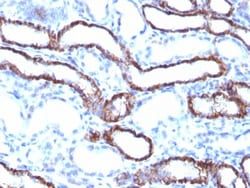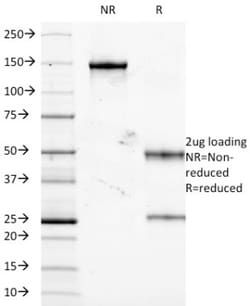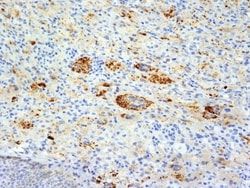Mouse anti-TLR4, Clone: TLR4/230, Novus Biologicals™
Mouse Monoclonal Antibody
Manufacturer: Fischer Scientific
The price for this product is unavailable. Please request a quote
Antigen
TLR4
Concentration
0.2 mg/mL
Applications
Flow Cytometry, Immunohistochemistry (Paraffin), Immunofluorescence
Conjugate
Unconjugated
Host Species
Mouse
Research Discipline
Adaptive Immunity, Cytokine Research, Immunology, Innate Immunity, Signal Transduction, Toll Like Receptors
Formulation
10mM PBS and 0.05% BSA with 0.05% Sodium Azide
Gene Alias
ARMD10, CD284, CD284 antigen, hTollhomolog of Drosophila toll, TOLL, toll-like receptor 4
Gene Symbols
TLR4
Isotype
IgG2a κ
Purification Method
Protein A or G purified
Test Specificity
This MAb reacts with human Toll-like receptor 2 (TLR4). It is a member of the Toll-like receptor (TLR) family, which plays a fundamental role in pathogen recognition and activation of innate immunity. TLRs are highly conserved from Drosophila to humans and share structural and functional similarities. They recognize pathogen-associated molecular patterns that are expressed on infectious agents, and mediate the production of cytokines necessary for the development of effective immunity. The various TLRs exhibit different patterns of expression. This receptor has been implicated in signal transduction events induced by lipopolysaccharide (LPS) found in most gram-negative bacteria. Mutations in this gene have been associated with differences in LPS responsiveness. Multiple transcript variants encoding different isoforms have been found for this gene.
Clone
TLR4/230
Dilution
Flow Cytometry 0.5 - 1 ug/million cells in 0.1 ml, Immunohistochemistry-Paraffin 0.5 - 1.0 ug/ml, Immunofluorescence 1 - 2 ug/ml
Classification
Monoclonal
Form
Purified
Regulatory Status
RUO
Target Species
Human, Rat, Porcine, Canine, Guinea Pig, Monkey
Gene Accession No.
O00206
Gene ID (Entrez)
7099
Immunogen
Recombinant human TLR4 protein
Primary or Secondary
Primary
Content And Storage
Store at 4C.
Description
- Ensure accurate, reproducible results in Flow Cytometry, Immunohistochemistry (Paraffin), Immunofluorescence TLR4 Monoclonal specifically detects TLR4 in Human, Rat, Porcine, Canine, Guinea Pig, Monkey samples
- It is validated for Functional.




